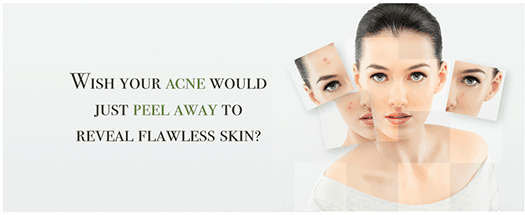Acne is the most common skin condition in the world, and something that we’ve all experienced at some point in our lives. No two cases of acne are the same, and some can be way more severe than others. One thing is for sure: Acne can not only have devastating effects physically, it can also affect you emotionally. Sometimes, the emotional consequences of bad acne can continue to haunt you long after the acne itself has resolved. The best way to treat acne is to nip it in the bud before it gets too bad. In order to treat it effectively, we need to understand why acne occurs. Our solution to acne treatment will have you on your way to clear skin.
What is Acne?
Acne is a common skin condition caused by inflammation of the hair follicles and oil-producing (sebaceous) glands of the skin. Acne usually starts during puberty, and can affect up to 80% of all adolescents. When skin cells are not being shed normally, the dead cells and oil (sebum) begin to block the hair follicles. Bacteria then starts to multiply inside the blocked, oil-filled follicles. This leads to inflammation, redness and pimples (pustules).
What Causes Acne?
In adolescents, acne flare-ups are mostly related to a natural increase in androgen hormones during the teen years. Genetic factors may also contribute to the problem. Other factors that can cause acne include the use of oily cosmetics, humidity, heavy sweating, and problems with the ovaries or adrenal glands. Acne also can be triggered by drugs such as lithium or steroids, both the type that are prescribed by physicians and potentially harmful “body-building” steroids. Contrary to popular belief, there is no link between diet and acne.
Types of Acne
Acne can cause:
- Blackheads and whiteheads (comedones) – Comedones are enlarged hair follicles filled with sebum. Blackheads are comedones that have opened to the skin’s surface. The color of the exposed sebum makes them appear black. Whiteheads are comedones that are closed on the surface.
- Pimples (pustules) – These are inflamed hair follicles. The bacteria in the follicle multiply, attracting infection-fighting cells, which release substances that cause irritation and redness. The follicle then ruptures, and spills the contents into the surrounding skin, which causes more inflammation.
- Nodules and cysts – These are larger infections of the hair follicles that extend deeper into the skin, forming firm, deep bumps and swellings. Like pimples, they are caused by increased sebum production and the growth of bacteria, which cause irritation and redness.
Acne Treatment
Acne can be treated with:
-
Topical Treatments. These can be either over-the-counter or prescription strength products which contain varying amounts of Salicylic Acid, Benzoyl Peroxide, or Sulfur as the main ingredient. The over-the-counter products are generally not as strong as prescription strength ones. Topical treatments can be in the form of at home kits or in office procedures.
The VI Peel Acne is an in-office chemical peel which is a very effective acne treatment. The VI Peel Acne contains high concentrations of Benzoyl Peroxide, Salicylic Acid and Vitamin C. These potent ingredients remove bacteria, clear the pores and increase cell turnover. The VI Peel Acne also contains Kojic Acid which brightens skin and reduces acne scars.
- Antibiotics. Physician prescribed antibiotics can be either applied directly to the skin or taken by mouth in pill form. Antibiotics reduce the growth of acne-causing bacteria and decrease inflammation. Antibiotics should not be used for longer than three to four months at a time. Prolonged use of antibiotics for acne treatment may result in an upset stomach, dizziness or skin discoloration. Some of the antibiotics used may also increase your skin’s sensitivity to sun exposure.
- Isotretinoin/tretinoin. This family of medications (Retin-A, Accutane, etc.) are usually reserved for cases of cystic acne, acne scarring, or severe acne that has failed the other treatments mentioned above. They can be very effective, however, their use is limited to no more than four months because of the risk of serious side effects. Retinoids are known to cause birth defects, so they can’t be used during pregnancy. Women on the medication who are sexually active must use contraception to make absolutely sure they do not become pregnant either during the four months of treatment or for one month after treatment. Because it also increases the skin’s sensitivity to sunlight, tretinoin should be used with a sunscreen.
- Oral contraceptives. In women, oral contraceptives (birth control pills) can control the hormone imbalances that contribute to acne formation. But, oral contraceptives are also associated with side effects including headaches, weight gain, breast tenderness, nausea, depression, and blood clots.
In many cases, a combination of the above treatments is required to successfully treat acne. That is why it’s important to be under the care of a trained physician who can monitor your progress and come up with a treatment plan which will reduce the risks of side effects.
Our personalized acne treatments have been designed by our board certified surgeon Dr. Michael Zadeh to specifically treat the needs of your skin. Using both in-office and at-home acne treatments we will have your skin looking clear and feeling healthier than it ever has before.
Are you ready to get rid of your acne once and for all? Call us now to schedule a free consultation with one of our skincare experts and find out which treatment is appropriate for you.



